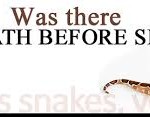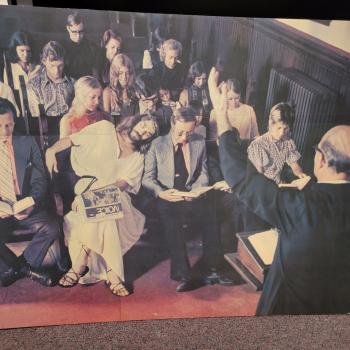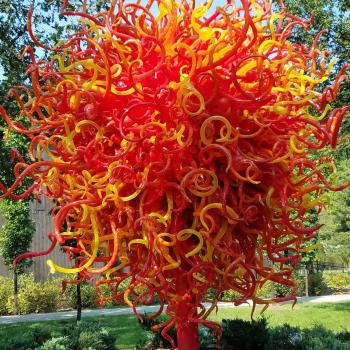On p. 120 Ron Osborn attempts a metaphor to explain post-foundational approaches— he says this “If we think of Christian beliefs and practices as the planks that make up a vessel (the church), we can imagine these planks being replaced one by one during a long voyage so that by the end of the journey the entire boat has been transformed into a new ship that is still, paradoxically, the same ship that left port.” He talks about the flexibility of a post-foundational approach. The problem is, that if these planks are some of the real fundamentals of the faith– say the resurrection of Jesus or the incarnation, then they are in fact irreplaceable planks, as would be the practice of sharing the Lord’s Supper, and so on. In other words, there are various planks, both of belief and praxis, which are irreplaceable by their very nature. The problem with post-foundationalism is that it is in danger of leaving the foundation behind, and having nothing left of permanence to stand on. Now if Osborn merely means that certain interpretations of the essentials of the faith may be replaceable, then there is something to be said for that. I would stress however that you can’t be strictly post-foundational and still be faithful to the essentials of our faith. You just can’t. For example, at another point in the book he suggests that the earliest atonement theory was the Christus Victor motif but it was later eclipsed by the penal substitutionary view. The problem with this is that penal substitutionary atonement is right there in our earliest NT documents— for example in Romans. The ransom theory (see Mk. 10.45) was not replaced by the penal substitutionary view, they existed side by side in early Christian thinking, and are both part of canonical theology, as they should be in our theological thinking.
A high view of Scripture as God’s living Word requires of us that we not take the easy way out and think in terms of some sort of evolutionary model of doctrine, even when it comes to the atonement. Most Evangelical Biblical scholars can hardly be accused of either literalism when it comes to non-literal texts, or fundamentalism, and yet they hold to a high view of Scripture, indeed most are comfortable with some kind of inerrancy language. Most of these same scholars however do not think of, and do not treat the Bible as a science textbook. The people who do that, as Osborn correctly points out, are mostly evangelists, apologetes, educated lay people, and in some cases scholars whose field of expertise is not the Bible. At points, Osborn reflects growing up in an ultra-conservative denomination, and unfortunately he doesn’t seem to fully realize the diversity that exists in broader Evangelicalism. He seems to mainly be reacting against his own denominational context.
In the second part of the book, Osborn drives home more strongly the need to recognize that neither the earth nor its creatures were flawless or perfect before the Fall. They were good, indeed very good, but not perfect. Perfection doesn’t come before the eschaton. The new creation is not simply the pre-Fall creation all over again, not least because it involves people in resurrection bodies, and apparently predators like lions, lying down with lambs, without thinking of lamb chops. In other words, Osborn is right that it is a mistake to read the eschaton back into Eden, or the very nature of original creation. I agree with Osborn when he says “According to Genesis, Adam and Eve were not created deathless or immortal in their physical persons. They were created as fully mortal beings from the start. Within the narrative universe of Hebrew Scripture,the only basis for humans avoiding death was their ongoing access to the fruit of the tree of life in the Garden of Eden.” (p. 131). This is correct and it means that mortality in itself was not an evil thing, good to know since Jesus was born mortal too. I would suggest as well that when Paul or Genesis talks about death as a punishment for sin, we are not talking about mere natural mortality. We are talking about a sort of death which only a miracle of resurrection could overcome– everlasting death.
At points in Osborn’s argument about animal suffering he seems to confuse innocence with purity. If by innocent one means not guilty of sin, then indeed animals are innocent. But this does not make them flawless, pure, or any of the other eschatological things we look and long for. Animal suffering matters because both God and human beings are compassionate creatures and care about animals. But the real presenting issue is ‘unjust’ or unnecessary suffering. If we were to state things this way— “is it unjust that animals are mortal, and can serve as food for other creatures?’ I think the answer to this is no. I think they were always mortal. And I think God created nature such that the balance of things is maintained by both death and birth, by both consumption and procreation. As one poet put it ‘life and death upon one tether, and running beautiful together’ (referring to a deer being chased by a hound). If we are squeamish about any and all animal suffering, this says more about us than about animal suffering per se. Go back and read the last four chapters of Job, and ask— What really is the divine perspective on the crocodile— a deadly predator if there ever was one, and one of the oldest of such predators. Osborn is right on p. 141 to wonder whether it is correct to project “human moral values onto nature”. Is it really cruel for an eagle to snatch and eat a fish, or is this just us in our anthropocentrism projecting our feelings on nature?
On pp. 143-44, Osborn interacts with the musings of C.S. Lewis who asks the question whether the world might not have already been fallen in some sense when humans came on the scene, and humans were sent to be redeemers of creation, restorers of shalom to the animal world, “and if he had not joined the enemy he might have succeeded in doing so to an extent” (quote on p. 144 is from The Problem of Pain). Cosmic fall before the human fall would explain not only the need for Eden as sanctuary for humans, but also why Adam was commanded to subdue the earth, presupposing it was in an unruly state. Osborn raises the possibility that Rev. 12.7-9 is relevant here— the casting down of Satan and his minions from heaven to earth (the question being when is this thought to have happened). Certainly Satan in the guise of the snake is already present in the Garden. Part of the problem of course is that the Bible does not tell us plainly or finally where evil first came from. It seems to simply be there from the start in the Garden, but perhaps Rev. 12 gives us a clue. We would do well however not to read the whole of Milton’s musing in Paradise Lost back into Genesis.
One further problem with post-foundationalism as manifested in this book is the tendency to reduce everything to narrative, ignoring all the other kinds of literature we have in the Bible, for example law or psalms or proverbs, none of which is narrative. Truth can be conveyed in a variety of ways, and imperatives are not to be read in the same way as narratives. Narratives are more slippery things, and better lend themselves to claims about multi-valency and the like. But the Bible is not just all narrative and no normative commands or claims. I do however like and agree with the quote from Wendell Berry, my fellow Kentuckian who says “we must credit God with the making of biting and stinging insects, poisonous serpents, weeds, poisonous weeds, dangerous beasts, and disease causing organisms. … That we may disapprove of these things does not mean that God is in error or that He ceded some of the creation work to Satan; it means we are deficient in wholeness, harmony, and understanding– that is, we are fallen.” (p. 151 for the quote). This ought to lead to more humility when arguments break out about the creation narratives….but then again, this is Kentucky, home of the Creation Science Museum, where we learn that humans roamed the earth with the dinosaurs. If only it were true and Jurassic Park was not just an imaginative film.
Towards the ending of the book, Osborn actually suggests two different explanations for animal suffering:1) God has created animals also with a certain measure of freedom and so natural evil and animal suffering emerge from these free and undetermined processes (p.161); 2) on p. 152, reflecting on Job 38-39 he says “The creation with its suffering and death included is good, very good because it is God’s creation. There is an order of existence that is mysteriously, terribly and wonderously God’s own– an order than cannot be anthropomorophically cut down to the measure of human scientific reasoning or human moral fastidiousnesss and systematic theology. Job is right to cry out in protest against his own sufferings; yet in turning his personal experience of suffering into an indictment against the creation in its entirety–against the injustice of existence—he goes too far.” (p. 152). This latter suggestion is surely nearer the mark, and it likely means that perhaps we should stop talking about ‘natural evil’ when it comes to animal suffering.
If a good God not merely allows it, but accepted that it was part and parcel of creating a world with some freedom, some limitations, some mortality, then it is not an evil thing but rather a natural one. If suffering seen through another lens created a world which longs for eternity but is inherently mortal and could not be immortal without Christ and the eschatological redemption, then we need to have our horizons expanded.
The real issue is not ‘death before the fall’ but the telos, the end goal, the aim of it all– resurrection life that is far more than mortal life, not merely a return to Eden, but a journey into new creation. Or as one wise early Christian said— “Not only so, but we glory in our sufferings, because we know that suffering produces perseverance, perseverance produces character, and character produces hope, and hope does not disappoint, because God’s love has been poured out into our hearts…” (Rom. 5.3-4). If all is evaluated not in terms of our origins, but our destiny, if we are indeed the people of Easter hope, then even suffering, even animal suffering should be evaluated in a different light.



















